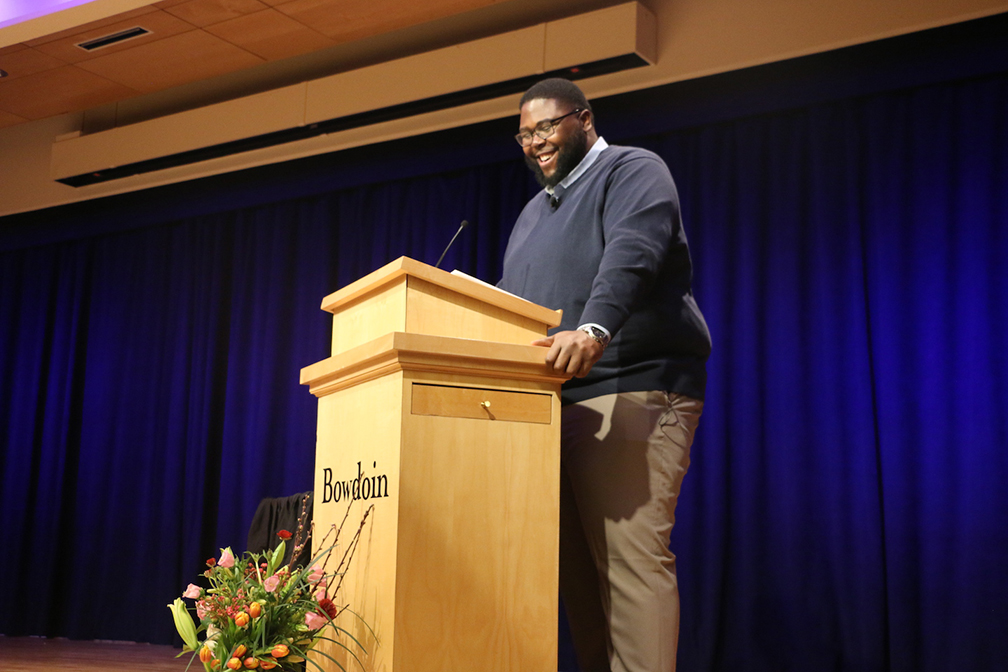Anthony Jack demands more of higher education
February 21, 2020
 Caroline Flaharty
Caroline FlahartyAnthony Jack, assistant professor at the Harvard Graduate School of Education, nearly broke into song as he spoke in front of a packed audience in Kresge Auditorium on Wednesday. With three fingers pressed against his palm and his pointer extended, he painted the air with his outstretched arm while addressing the crowd.
Jack gave this semester’s Santagata Memorial Lecture based on his book, “The Privileged Poor: How Elite Colleges are Failing Poor Students.” The lecture served as a keynote event of Bowdoin’s Black History Month and Beyond celebration.
Speaking to a diverse crowd of students, faculty and community members, Jack delivered a clear and impassioned message: it is not the role of students to educate the university on what they should already be doing—it is the role of the institution to know and to learn to be better.
Jack, once a low-income, first-generation student himself, spoke of a distinction between “the privileged poor,” low-income students who attended prep schools before entering college and thus became familiar with many conventions and practices of elite academic institutions, and lower income students who did not. Speaking from personal experience, Jack discussed what it is like for students who are unfamiliar with the landscape of elite institutions to walk onto this campus.
“Access ain’t inclusion,” he said.
He emphasized that learning the “hidden curriculum” of office hours, letters of recommendation and the particular ways of being that are often taken for granted in these privileged spaces can be challenging for students new to these institutions.
There were some people who were integral to Jack’s success in his college years, though they are often overlooked. They were the housekeepers, the security officers, the dining staff—“the unsung heroes of the college”—whom Jack thanked during the start of his lecture.
Associate Dean of Student Affairs and Director of Residential and Student Life Mike Ranen, who worked at Harvard when Jack attended the university as a graduate student, has been following Jack’s work for a number of years now. At Bowdoin, as part of an annual tradition of selecting a particular text to read each summer, Ranen required last year that all his student leaders read Jack’s book. Ranen and the Office of Residential Life (ResLife) then were able to secure Jack’s visit to campus this month as a part of the College’s Black History Month programming with funding from the Santagata Memorial Fund.
Director of Residential Education Whitney Hogan said that Jack’s words grounded ResLife members, helping them understand that the culture shock of an elite liberal arts school is more challenging for some than for others. Both Jack’s lecture and his book centered on his life experiences, a story with which many students can find parallels to in their own lives. However, these stories are not often widely heard on Bowdoin’s campus.
Following Jack’s lecture, ResLife member Joshua Brooks ’20 asked the question on the minds of many students that night: often on campus, students say “this is only the beginning of the conversation,” but fail to follow up.
During Jack’s second day on campus, he had a full day of highly attended meetings with nearly 100 faculty, staff and administrators. Hogan noted that Jack delivered on digging into the issues that are often avoided at elite institutions.
Jack concluded by asking for more: more from the students—but especially more from the administration and from the College.
Jack concluded with, “Demand as much from Bowdoin as Bowdoin demands of you … Be bold, be you.”
Editor’s Note, 2/21,20, 10:59 a.m.: This article has been updated to correct the definition of “the privileged poor.” The number of faculty and staff who participated in meetings with Jack on his second day on campus has also been corrected.

Comments
Before submitting a comment, please review our comment policy. Some key points from the policy: